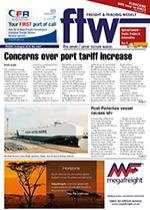Western Cape exporters need to up the ante and really make use of the opportunities available through the European Union-Southern African Development Community Economic Partnership Agreement (EPA).
In an effort to assist exporters to understand the trade agreement better, Wesgro, in conjunction with the Trade Law Centre (Tralac), have developed a user-friendly booklet to guide exporters on the trade agreement and the various opportunities it presents. Under the agreement, 97.8% of exports from South Africa to the EU are duty free.
“There are companies that have seen opportunities and our exports to the EU are growing,” said Denan Kuni, head of international trade and development at Wesgro. “We have also seen an increase in the range of products being exported and it’s definitely more diverse than before.” But, he said, this was just the tip of the iceberg because if more exporters understood the agreement and were privy to how to access the benefits, exports could be increased significantly, allowing not only for economic growth for the province but the country at large.
According to Kuni, the booklet, which is accessible from Wesgro and Tralac, is a handy tool for exporters in the province that want to know more about the trade agreement which, at face value, seems extremely complex. Seminars and workshops on South Africa’s trade agreements are also an integral part of the bigger strategy of growing exports. “We have to train our companies to export,” said Kuni.
“We need to share information about what the trade agreements are and where the opportunities lie. Too many companies are not utilizing the EPA.” Which is why Wesgro and Tralac, along with the Departments of Trade and Industry, as well as Agriculture, Forestry and Fisheries are increasingly hosting seminars on the trade agreements. According to Kuni, two seminars have been held in recent weeks in Cape Town – one addressing Agoa and the other the agreement.
“The EPA, in particular, is important to Western Cape Exporters as it provides significant opportunities for South African agriculture, and fish exports in particular.
“Considering that 53% of the country’s agricultural exports are from the Western Cape, exporters in this region could significantly increase their duty-free exports into the EU through the agreement, thanks to the improved market access it offers,” he told FTW.
Kuni said the EU was currently the second largest market for Western Cape exports with Africa having officially become the largest export market for the province with around R45 billion worth of goods and services moving into the continent.
According to Kuni, the seminars offer a platform for officials from Wesgro and government to share practical and useful information with exporters about the opportunities that exist under the EPA.
This includes exploring reasons why some opportunities are under-utilized and the facilitation of discussion around ways in which the government can support South African businesses in taking full advantage of the benefits of duty-free market access to the EU available to them under the EPA.

